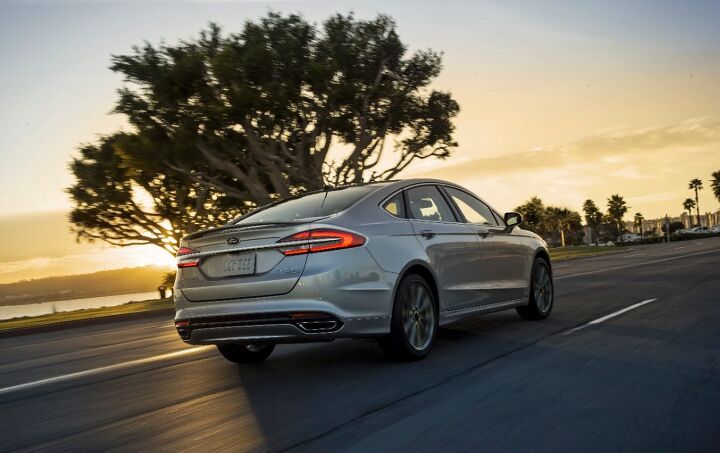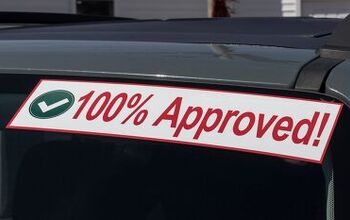Used Car Prices Take a Dive, Spelling More Worry for Anxious OEMs

At this point, only two things in our present reality bear any similarity to what took place in the Great Before: average new car transaction prices are shooting for the Van Allen Belt, and pickups sell like hotcakes. The relationship between 1 and 2 can’t be downplayed.
Everything else has been turned upside down by the coronavirus pandemic and the resulting plunge in sales spurred by both fear and state lockdown measures. Domestic market share is up, zero-interest loans are proliferating, and used vehicle prices are falling through the floor.
That latter issue could spell big losses for manufacturers whose main business is selling new vehicles.
The industry-standard measure of used vehicle prices, the Manheim Used Vehicle Value Index, fell 11.8 percent in the first half of April — a drop roughly equivalent of what we saw during the Great Recession of 2008-2009. If the index holds firm at that figure for the month, it could set a record, Bloomberg notes.
It’s a drop that caught even analysts at JPMorgan Chase & Co. off-guard.
“The real losers of the development are likely the captive-finance subsidiaries of automakers like GM and Ford, and the rental-car companies,” wrote head analyst Ryan Brinkman in a Monday investor’s note, adding that GM’s captive finance arm could lose $3 billion if used car prices sink 10 percent for the second quarter of 2020. Ford Credit could lose nearly that amount, $2.8 billion, Brinkman wrote.
The reason for the plunge is simple. Weak demand, with fewer auctions ongoing. Besides that, dealers and rental agencies are expected to fling used vehicles at those auctions once they restart in the hopes of making a quick buck. Rental agencies like Hertz have seen their shares plummet amid the viral mayhem.
All of this is the exact opposite of what we saw over the past few years, when used-car prices climbed rapidly amid a surge in well-optioned pickup and SUV sales that muscled buyers into the used field with their sky-high ATPs. Lease offers for more conventional rolling stock were often unattractive due to the expected depreciation. This generated greater demand for used vehicles, but buyers had to compete for very in-demand off-lease fare boasting greater standard safety and convenience features and a greater mix of trucks and SUVs to sedans than ever before. The Manheim index rose steeply over 2017, 2018, and 2019.
“We’re a bit in wait-and-see mode, and we think we’ll have a much clearer sense of used-car prices once shelter-in-place orders are lifted and auction activities can resume more normal levels,” Jennifer Laclair, chief financial officer at Ally Financial, told Bloomberg. The firm had forecast a 5-to-7-percent drop in used vehicle prices.
One thing automakers like Ford and GM are doing to push back against the potential losses is by helping keep existing vehicles in the hands of lessees, Laclair said. Lease extensions offered since the outset of the United States’ shelter-in-place era should help stem the flow of used vehicles into auctions a bit, but it’s not a cure-all.
J.D. Power data shows 1.8 million Americans will see their leases run out between March and July of this year. “OEMs may realize losses on off-lease vehicles” if used-vehicle prices fall, the firm wrote on March 25th.
[Image: Ford]

More by Steph Willems
Latest Car Reviews
Read moreLatest Product Reviews
Read moreRecent Comments
- Jeff Not bad just oil changes and tire rotations. Most of the recalls on my Maverick have been fixed with programming. Did have to buy 1 new tire for my Maverick got a nail in the sidewall.
- Carson D Some of my friends used to drive Tacomas. They bought them new about fifteen years ago, and they kept them for at least a decade. While it is true that they replaced their Tacomas with full-sized pickups that cost a fair amount of money, I don't think they'd have been Tacoma buyers in 2008 if a well-equipped 4x4 Tacoma cost the equivalent of $65K today. Call it a theory.
- Eliyahu A fine sedan made even nicer with the turbo. Honda could take a lesson in seat comfort.
- MaintenanceCosts Seems like a good way to combine the worst attributes of a roadster and a body-on-frame truck. But an LS always sounds nice.
- MRF 95 T-Bird I recently saw, in Florida no less an SSR parked in someone’s driveway next to a Cadillac XLR. All that was needed to complete the Lutz era retractable roof trifecta was a Pontiac G6 retractable. I’ve had a soft spot for these an other retro styled vehicles of the era but did Lutz really have to drop the Camaro and Firebird for the SSR halo vehicle?


































Comments
Join the conversation
Cash for Clunkers has been over for more than 10 years and even then many of the vehicles were high mileage and on their last legs. Many of those vehicles had little value and because of that many owners would have held onto them anyway. Trade in value on most older cars is not much and for many it makes more sense to hold on to the old car especially if they have children that are either driving age or close to driving age. Also cars last longer and it is not unusual to get 15 or more years out of a car. Car dealers have large markups on most used vehicles much much more than you pay if you are buying from an individual. Cash for Clunkers was used as an excuse by car dealers to markup used car prices--most of the used vehicles dealers sell would not have been candidates for Cash for Clunkers.
Good to know on the lease bit...mine is up July 2nd. As I intend to buy it however, I wonder if I can leverage that in any way? I was led to believe that there wasn't any negotiation at the end of a lease if you wanted to buy but hadn't really looked into it yet.